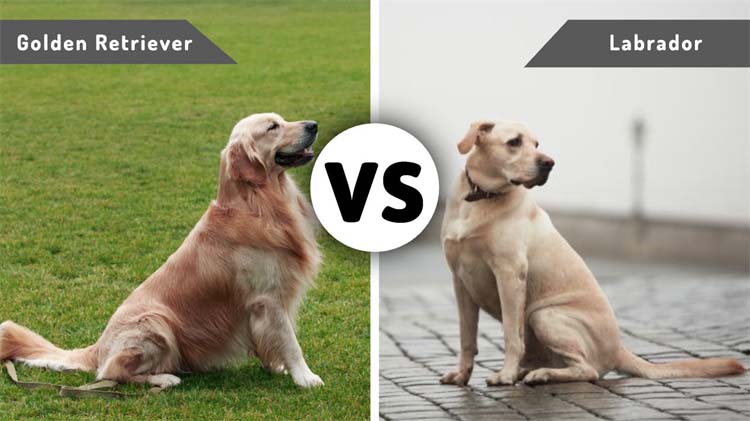Labrador VS Golden Retrievers: Major Breed Differences
Because golden retrievers and Labrador retrievers are somewhat related breeds of dogs, many people are curious about the differences between the two. Dogs are divided into seven categories by the American Kennel Club (AKC) according to the initial purpose of their breeding. As retrievers, golden and labs belong to the sports group and make great family pets, exercise friends, and outdoor companions.
But do you know what distinguishes both of them, though?
These both relatives’ retrievers are pleasant, energetic, affectionate, and hilarious sporting dogs. It is difficult for dog owners to choose one retriever breed over another because of the many similarities between these active hunting dogs.
We’ve put together an easy-to-read guide about these two well-liked breeds to assist you make an informed decision about your future family pet. This is a brief analysis of the Labrador vs. Golden Retriever subject.
Let’s explore;
Physical characteristics
Appearance
Labrador retrievers and Golden retrievers have the following traits in common:
Both are retriever breeds with long tails, webbed feet, folded ears, and a preference for water.
The coats of both breeds are water-resistant. Compared to Labradors with shorter hair, Golden Retrievers have longer, wavy coats; therefore they require a little more frequent brushing every two to three days.

For both species, regular weekly brushing is required. That frequency might go up during peak shedding periods, including seasonal shifts. The jaws of both breeds are unusually soft as well. They are perfect for hunting and retrieving because of this characteristic, which enables them to carry objects without injury.
Nevertheless, despite their similarities, Golden Retrievers and Labradors can be distinguished from one another by observing their overall body forms and profiles.
Labs have wider heads and more muscular bodies, whereas golden retrievers have longer snouts.
Peculiar qualities of golden retrievers
Distinctive qualities of Labrador retrievers

Origin
For thousands of years, people have selectively bred dogs for various purposes. There is no distinction between the Golden Retriever and the Labrador; both breeds were created with a particular function in mind.
Golden Retriever origins
In the late 1800s, golden retrievers first appeared in the Scottish Highlands. These canines came from gun dog breeding. More precisely, their huge, soft, and delicate jaws were developed to collect animals their master had shot carefully.

Labrador retriever Origins
When fishermen and hunters flocked to the rivers and lakes in Canada in the middle of the 1800s to hunt birds, fish, or other small mammals, they produced Labradors. Labradors were bred to have big, soft jaws, just like Golden Retrievers, to prevent them from ruining the prey they caught for their masters.
Labradors were mostly bred as water gun dogs for a very long time. Because they could swim well, they were frequently employed to dive into marshes, rivers, and lakes in order to retrieve prey from the water.
Structure and color
| 55–75 pound | Golden retrievers |
| 65–80 lbs | Labrador retrievers |
Labradors and Goldens appear to be about the same height. But compared to Labradors, Goldens are usually considered as being more graceful and slimmer-looking. This is because the two breeds’ chest bone structures differ somewhat.
The chests of golden retrievers are thin and slender. The dense underbrush in the Scottish Highlands makes it challenging to run through, thus they were bred to have this narrow chest. They could move quickly through the thick undergrowth and pursue fallen prey because of their narrower, leaner shape.

Conversely, Labradors were developed to pursue prey in the water. They appear fairly stocky because they have far wider chests than Goldens. This is more than just a visual distinction. Because of their wider chests, labradors can modify their buoyancy due to the expansion of their lungs. This allows them to search for their owner’s prey while floating in the water without paddling and using energy.
Dogs of both types are enormous, although Labs are a little bigger. Additionally, males are marginally bigger than females in both breeds. Although Labrador Retrievers tend to be slightly larger overall, both Labrador and Golden Retrievers are similar in size and weight:

Golden Retrievers have warmer colors ranging from yellow to rust red, but Labradors only come in three colors: black, chocolate, and yellow.
Competitively And Trainability
These dog breeds were developed to be highly clever, energetic, and to carry out particular tasks for their human partners. Both breeds are therefore extremely task-oriented and trainable.
But each species approaches these responsibilities in a very different manner from the others, particularly when faced with competition.

Golden Retriever
Golden Retrievers enjoy a challenge and are naturally fierce competitors. They are people-pleasers who will stop at nothing to win your favors. This implies that, particularly if you have given them a mission to do, they will attempt to outcompete other canines for your love and attention.
Labrador
Conversely, Labradors dislike rivalry and can get quite grumpy and agitated if they are always in competition with other dogs for your love, attention, or finished tasks. When given a task, these dogs, unlike Golden, would much rather work alone and will fervently seek praise from you whether you have time for it or not.
Personality and traits
These two athletic dogs frequently exhibit high levels of activity and a craving for attention. Whichever breed you and your family chooses, make sure they have lots of space to run around and play, both inside and outside, and be prepared to engage in physical activities with them, like going for a swim or playing fetch.

They need to work out for at least an hour every day. Apartments may provide challenges because of their desire for space and exploration. Consider other breeds if you intend to leave your pet alone for extended periods of time. Both Labrador and Golden Retrievers don’t especially like spending a lot of time in their crates or by themselves.
Give these dogs the time and attention they need because they are both prone to chewing if they aren’t kept busy with toys, activities, and playtime. Otherwise, your shoes and other valuables may end up chewed on.
Both breeds are bright and genuine people-pleasers, which is advantageous for owners worldwide since they can be trained easily and are just as loving. With the one desire in life being to be loved, Labradors and Golden Retrievers are cheerful and gregarious when they see their owners and kind and patient with kids and other animals.
Labradors vs. Golden Retrievers: Human Dependence
It’s advised to consider your dog’s temperament and level of dependence on you when choosing what breed to bring into your house. Certain types of dogs are far more independent and laid-back than others, and some are naturally very needy and will require you to be home a lot.

Golden Retriever
- Undoubtedly, golden retrievers are “clingy/needy” dogs.
- They require their owners’ constant presence and thrive on consistent physical stimulation such as cuddling, games, walks, and puzzles.
- Unfortunately, this also means that Goldens are more likely to experience separation anxiety if they receive poor training, have their routine disturbed, or experience trauma.
- Remember that although these dogs are highly intelligent, they may turn into equally destructive animals if they feel bored or abandoned.
Labrador
Health care
Lifespan Estimate
Ages of golden retrievers: 10–13
Labrador retrievers: Ages 10 to 12
Health problems that Labrador and Golden retrievers have in common:
Particular health problems for Labrador retrievers:
Golden retriever-specific health concerns:
Healthy Labradors and Golden often have a lifespan of 10 to 12 years, making them ideal for an active family setting. There are a few health issues with both types to be mindful of, just like with any purebred pet.

Labradors and Golden retrievers are prone to progressive retinal atrophy, a gradual loss of vision, and hip and elbow dysplasia. There is a cancer risk in golden retrievers.
Additionally, Labradors are prone to obesity like many large dogs, so it’s critical to maintain a regular exercise schedule and nutrition to prevent excessive weight gain and lessen the strain on joints.
Key Distinctions between Labradors and Golden Retrievers in a glance;
The following are the key distinctions between Labradors and Golden Retrievers:
Wrapping up
Labs and golden retrievers belong in the sports dog group since they were bred to be hunting partners. They were made to spend the entire day swimming, jogging, and capturing wildlife with their human partners. They, therefore, fit in well with an active lifestyle. Both breeds are great for walking, running, and exploring.
Both labs and golden retrievers are exceptionally smart canines that perform well in various capacities, including search and rescue, guide, and service dog work.
You can’t go wrong with any of these breeds, regardless of which one you choose, even if each type has unique characteristics that appeal to different families and lifestyles. Labradors and golden retrievers make joyful, energetic pets devoted to their owners and excellent with children.






